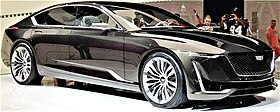Cadillac Escala
| Cadillac Escala | |
|---|---|

Cadillac Escala at the 2016 LA Auto Show
|
|
| Overview | |
| Manufacturer | Cadillac (General Motors) |
| Production | 2016 (concept car) |
| Designer | Frank Wu, Aaron Riggs (exterior) Eric Um (interior) |
| Body and chassis | |
| Class | Full-size luxury car |
| Body style | 4-door liftback hardtop |
| Layout | Front-engine, rear-wheel-drive |
| Platform | GM Omega platform |
| Related | Cadillac CT6 |
| Powertrain | |
| Engine | 4.2 L V8 (twin-turbo gasoline) |
| Transmission | 10-speed automatic |
| Dimensions | |
| Wheelbase | 127.1 in (3,228.3 mm) |
| Length | 210.5 in (5,346.7 mm) |
| Width | 76.7 in (1,948.2 mm) |
| Height | 57.3 in (1,455.4 mm) |
| Chronology | |
| Predecessor | Cadillac Elmiraj |
The Cadillac Escala is a concept car built by Cadillac for the 2016 Pebble Beach Concours d'Elegance. The last of a trifecta of concept cars initially conceived in 2007, it is preceded by the Ciel and Elmiraj, which had debuted back in 2011 and 2013 respectively. The Escala previews Cadillac's future design language under the leadership of president Johan de Nysschen, being an evolution of the Art and Science design philosophy that has been used on its cars for over a decade.
The Escala was first announced via a trailer video on August 15, 2016. Its name, revealed one day before its public debut, derives from the Spanish word for scale. This refers to the Escala utilizing an elongated version of the Cadillac CT6's Omega underpinnings, being approximately six inches longer than the latter. The car was unveiled at a cocktail party in Carmel-by-the-Sea, California on August 18, 2016, which was attended by Johan de Nysschen, GM Vice President of Global Design Michael Simcoe and Cadillac's executive director of global design Andrew Smith, along with several other executives.
Although yet to be officially confirmed for production, it was described by de Nysschen as "a potential addition to our existing product plan” in a press release, its ultimate fate determined by the fertility of the flagship luxury sedan market. However, it previews the design, powertrain and other advanced technological features currently in development that is set to appear on other upcoming Cadillac production cars in the future.
The exterior, painted in a nine-layer pearlescent blackish-brown "Gaia" finish, blends Cadillac's trademark Art and Science era design cues with more contemporary ones, being the first Cadillac to feature horizontal headlamps since the Seville was discontinued in 2004. This was done to give the car a more understated, harmonious look, in which simplicity is a prevalent theme on the Escala's design. They are complemented by two vertical strips of OLED daytime running lamps positioned just below the headlamps. A monotone Cadillac emblem adorns the three-dimensional mesh grille, patterned with several miniature crests. The car is designed as a four-door hardtop with a sloping rear roofline, giving a more athletic appearance, with a liftback tailgate at the rear end. When the trunk is opened, the cargo floor rises up to enable easier access to luggage. Also present on the car's C-pillar is the Hofmeister kink, a rarely seen trait for a Cadillac, possibly paying homage to the fastback Cadillac coupés of the late 1940s. Cadillac's signature vertical taillights are reworked, now added with a horizontal strip. It sits on 22-inch dual layer spoke wheels, fitted with 20-inch tires co-developed with Michelin that has the Cadillac chevron exclusively engraved onto the tire tread. The newly designed front fascia is expected to make its way to Cadillac production models starting in late 2018.
...
Wikipedia
